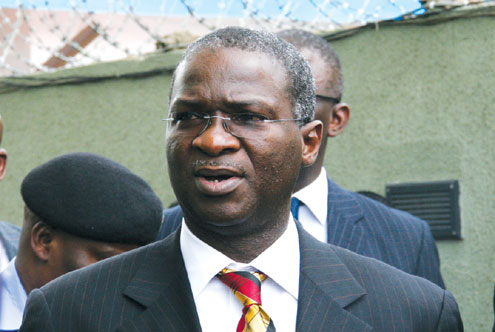The Federal Government has called for a collaborative approach toward acheving a sustainable and resilient urban development in the country.

The Minister of Works and Housing, Mr Babatunde Fashola, made the call at the inauguration of the first Annual Policy Dialogue Series on Sustainable Human Settlements in Nigeria on Thursday, November 19, 2020 in Abuja.
He was represented at the virtual meeting by Mr Olasukanmi Dunmoye, Director, Department of Urban and Regional Development, Federal Ministry of Works and Housing.
According to Fashola, cities in Nigeria have been battling with uncontrolled and unplanned growth as well as inadequate provision of essential services such as water and sanitation, solid waste management.
Fashola said “Urban October”, a month set aside by the United Nations for a series of publicity, sensitisation activities to address issues of urbanisation on sustainable human settlements, had given the ministry the clue to advance this advocacy.
“You will recall that in last 12 months, city life has changed dramatically due to the impact of COVID-19 alongside its social, political and financial impact in reshaping urban life around the world in an unprecedented manner.
“This pandemic is coming at a time when the Federal Government of Nigeria is paying serious attention to the issues and challenges facing human settlements.
“Urbanisation, if well managed, has the potential to create opportunities for a better life, provide a part way for a sustainable environment and act as an engine of economic growth and sustainable human settlement development,” he said.
Fashola added that urbanisation had become one of the most transformative positives shaping the world in the 21st century.
He noted that it was a phenomenon if harnessed, would promote economic productivity, inclusive growth and environmental development.
“Cities in Nigeria have been battling with uncontrolled and unplanned growth as well as inadequate provision of essential services such as water and sanitation, solid waste management.
“Transportation, health and education had led to the increase in the proliferation of slum settlements.
“In the same vein, other set backs include economic challenges of assessing finance for mortgages, mass housing and others, social exclusion migration, environmental challenges caused by climate change.”
The minister said the motive for the event was to recognise and encourage initiatives across the nation that tend to contribute to improving the living environment for the benefit of the citizens.
“The recommendations from this first annual policy dialogue are expected to provide guidance and action plan for sector stakeholders toward implementation of sustainable development goals as well as related SDGs issues.
“Our intention is to adopt a holistic and multi dimensional approach to promoting resilient and sustainable cities and urban settlements in Nigeria.
“We therefore seek to engender the collaborative effort of the federal state and local governments, the private sector and all the other stakeholders in the urban development sector.
“This collaborative approach cannot be effective if all the other partners do not perform their functions adequately well by proffering practical solutions to the issues at hand.
“The import of this is to enjoin all and sundry to complement each other in any endeavour that will provide innovative approaches to building sustainable cities for citizens in Nigeria especially to curshion the post COVID-19 era,” Fashola said.
In his keynote address, Mr Olutoyin Ayinde, National President, Nigerian Institute of Town Planners (NITP), said the nation could avoid chaos in its urbanisation stride by addressing key issues that affect urbanisation.
Ayinde said the country could get it right by leveraging on the opportunity presented by the dialogue to get to channel the course to the right direction and bounce back from slump disasters.
For his part, Prof. Bade Falade, the Chief Executive, Go2Search and former UN-Habitat Programme Manager, said the problem of urbanisation faced by the nation was caused by the colonial masters.
He said they divided the nation into political and religious sections.
According to him, what is known as GRAs today were once the locations where the colonial masters lived with the basic amenities in place while the other sections now called slumps had none of those things.
He added that Nigeria still had 17 to 20 million housing deficit, which showed that the country was far from achieving urbanisation.
Falade said the federal government needed to liase with states and local governments if it must solve its urbanisation problem.
The expert also called for the development of the nation’s master plan on urbanisation and collection of data, adding that the ministry must also have a yearly report of what it was doing in order to measure its performance.
By Perpetua Onuegbu
